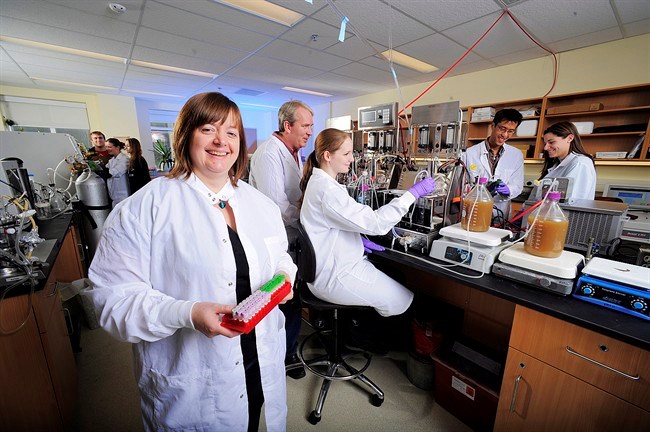TORONTO - Researchers have created a synthetic "poop" aimed at treating recurrent infections of C. difficile, a toxin-producing bacterium that causes severe and often debilitating diarrhea.
The fake stool, dubbed "RePOOPulate," is intended to replace donated human stool used in fecal transplants, a treatment that's been successful in overcoming intractable cases of C. difficile infection.
Clostridium difficile can take hold when a person is exposed to the highly contagious bacteria while taking antibiotics for another infection. Because those drugs destroy healthy, protective bacteria in the gut, C. diff is allowed to overpopulate the large intestine.
C. diff is typically treated with a different antibiotic, but can rebound once treatment stops, leading to chronic rounds of re-infection and retreatment. The disease can lead to severe and life-threatening inflammation of the colon.
Fecal transplants have been successful in knocking out C. difficile by repopulating a person's colon with donated healthy bacteria, but the "ick" factor makes it difficult for patients to accept.
"The problem is, of course, that fecal transplants are kind of primitive and disgusting," said Emma Allen-Vercoe, a microbiologist at the University of Guelph who led development of the synthetic poop. "Patients don't like it. A lot of them will put up with it because they're desperate ... and donors are not terribly keen usually."
The artificial stool is made up of 33 different bacterial strains initially derived from donor stool and grown in the Robo-gut, a lab system designed by Allen-Vercoe that mimics conditions in a human's large intestine.
"It looks a little like a vanilla milkshake," she said of the preparation of bacterial matter in a thick saline solution. "And it doesn't smell nearly as bad as poop, I must say."
The synthetic stool is given to a patient using a colonoscopy, the same way a fecal transplant is performed. But the "ecosystem," as it's formally known, doesn't have to be screened first for infectious diseases as donor stool would and is therefore safer, she said.
"The idea was we would be able to make an ecosystem that was reproducible, so it could be made for a large number of people and provided off the shelf," said Allen-Vercoe. "And (it's) obviously palatable, much more palatable than stool, and also easier to make to control."
In a study published Tuesday in the journal Microbiome, Allen-Vercoe and collaborators describe testing RePOOPulate in two patients with chronic C. difficile infections who had previously failed to respond to several rounds of antibiotics aimed at getting rid of the C. diff.
After treatment with the fake poop, both elderly women were symptom-free within three days and tested negative for C. diff six months later, said co-author Dr. Elaine Petrof, an infectious disease specialist at Queen's University in Kingston, Ont., who performed the transplants.
Petrof said later testing of stool samples from the women showed that some features of the synthetic stool had stabilized and persisted in their colons.
What was even more surprising was that the two patients had subsequently taken antibiotics for other infections, but neither had developed recurrent C. difficile as a result.
While the study is small, with only two patients, the results appear promising as a potential way to stop the "revolving door" of infection, treatment and reinfection that not only severely disrupts patients' lives, but can also permanently destroy their health, Petrof said.
Dr. Andrew Simor, an infectious diseases specialist at Sunnybrook Health Sciences Centre in Toronto, said the idea of creating bacteria-rich artificial stool is not a new idea, "but I think it's a great idea."
Simor, who was not involved in the research, said the work is a step in the right direction, but at this point is only a proof-of-principle and needs much further testing to make sure it is safe as well as effective.
He also cautioned that the make-up of normal flora in the human bowel is extraordinarily complex, consisting of "thousands of different bacterial species in different concentrations, and to try to sort out which ones are the important ones and the protective ones is not a trivial matter.
"So you want to make sure you've got the right mix of normal bacteria."
Infectious diseases specialist Dr. Michael Silverman, who performs fecal transplants at Lakeridge Health in Oshawa, Ont., agrees the research is important and a step forward.
"The goal is to eventually try to move away from fecal transplants, to find more palatable options," he said.
However, the difficulty with mass-producing bacterial matter is that over time, the strains can become "lab-adapted" and no longer behave as they do in the human gut.
"So the goal here is to keep them as similar to what they would be in the gut for as long as possible," said Silverman, adding that there are many technical challenges in producing the material commercially.
"Whether it will be able to be of widespread application or not, it's not clear — hopefully, but it's too early to know for sure.
"The problem is massive," he said of C. difficile infection, "and I'm glad people are working on it because it's a huge public health problem for Canada."
At this point, RePOOPulate is considered experimental and larger clinical trials would be needed before it could be commercially produced and approved by Health Canada for widespread use.
Allen-Vercoe said the research team is also working on a freeze-dried version that could be made into a encapsulated, time-released tablet that could be taken by mouth and pass through the stomach to the intestines. If successful, they hope to team with a commercial partner to produce the oral medication, she said.

